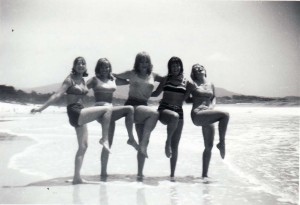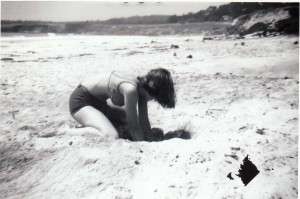
I first met Carolyn in Titus Hall at UC Davis. She lived in a dorm room down the hall from me with Christine Enloe, a friend she had known from Chico. They were both bright, fun-loving, and curious about life. My roommate Terry Murray and I immediately took a liking to them, and so did Jane Donlon, who also lived down the hall. We spent many hours talking, laughing, and sharing our liberating experiences being away from home. Carolyn was definitely the most intellectual one of the group, always questioning and analyzing.
We continued our friendship the next semester in Davis, even though we all lived in different places. That summer and the next, I also spent some time with Carolyn in San Francisco, where her parents lived, exploring the city, talking all the time. Though we both had lived in intellectual households growing up, there were some marked differences between our families. I came from a family with a liberal mother and a very conservative father who divorced when I was sixteen. Except for holidays, we always ate separately from our parents, so I was fascinated when I had dinner for the first time at Carolyn’s house with not only her parents and sisters, but others invited from Glide Memorial Church, where her dad was the minister. The dinners were filled with stimulating conversations and comforting food cooked by her warm and inviting mother. I was in awe of her father, who was so bright and insightful. I loved Glide Memorial Church, the music, and the many people with whom we mingled, and I could see how Carolyn was the product of her environment: she was truly a person who was concerned about the social injustices of the world and, moreover, felt like she could change it. She always talked about going to graduate school in International Relations and working for the United Nations.
I stayed at Davis when Carolyn went off to Bordeaux for her junior year. I looked forward to her postcards and letters describing her interesting and, I thought, exotic life in France. Just the fact that she had a French boyfriend was enough for me. When she returned from France, we both talked about possibly transferring to Berkeley where life in the late 60s was the hub of intellectualism and activism, but we stayed at Davis.
We lived together briefly in a house with six other women, which was where one of my roommates introduced Carolyn to Larry Layton. They were immediately attracted to each other and later fell in love. After that we really didn’t see Carolyn all that much. When we graduated, I went off to France, but Carolyn and Larry got married and remained in Davis, where she got her teaching credential.
When I returned from France the end of 1967, my friend Terry and I went to visit Larry and Carolyn. I sensed some tension between the two of them, but it seemed that they had similar goals and dreams and were building a life together. That was the last time I saw them. When we talked on the phone later in 1968, she told me about her excitement with her new life. She and Larry had joined Peoples Temple in Redwood Valley, and she had gotten a teaching job. I remember her saying that she never thought that she would be part of an organized, spiritual community, but that the “leader” was an incredible man with such visionary dreams. We ended our conversation with her encouraging me to come visit the community. I never did, though I did move to a commune in Mendocino County after the Temple moved to San Francisco. My last contact with the Moore family came during the student strike at Berkeley, when I ran into Carolyn’s sister Rebecca, who filled me in with what my friend was doing in the Temple.
My life took me from Mendocino County to Berkeley, and back to Mendocino County. That was where I first read the newspaper stories about the Jonestown mass suicide. Like everyone else, I was shocked by what I read, but unlike other people, I was also confused. I had thought that Carolyn was too smart and intuitive to still be a part of a community that would condone that. Even so, I had a nagging feeling that she was among the fatalities.
I was somewhat of a recluse back then – not reading newspapers regularly and not having a phone – so I asked my mother’s boyfriend who worked as a reporter for the Chronicle to look for her name. I was devastated to open the mail one day and find a clipping from Herb Caen’s column that excerpted a sermon that Carolyn’s father delivered at his church in Reno right after the tragedy. It was then that I realized how deeply Carolyn had been involved with Peoples Temple and with Jim Jones. I wrote a letter to her parents, knowing how devastated they must have been. I really didn’t know if her parents even remembered me, but I immediately got a letter back from Carolyn’s wonderful mother, saying that, “of course” she remembered me. She proceeded to chronicle the events that led up to the suicides, together with some insightful words from the sermon.

In retrospect, I can understand what attracted Carolyn to the Temple. She always had a heart of gold and had wanted to make a difference in the world. That combination along with what was happening with the 1960s and 70s made the Temple attractive to her, as it did for so many others. Those were tumultuous and exciting, yet potentially dangerous, times.
I often think of Carolyn and miss her terribly. We were such close friends at Davis, discovering together who we were becoming. In many ways now, that period seems like another life.
I recently came across the letter that Carolyn’s mother had written to me which included a poem, “The Auguries of Innocence,” by William Blake. It is one that gives me comfort, especially when I think of Carolyn. Its most familiar lines follow:
Joy and woe are woven fine,
A clothing for the soul divine;
Under every grief and pine
Runs a joy with silken twine.
It is right it should be so;
Man was made for joy and woe;
And, when this we rightly know,
Safely through the world we go.
(Two poems by Kathy Sparrow about Carolyn Layton appear here in this year’s edition of the jonestown report.)